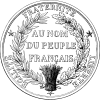
Back الجمهورية الفرنسية الخامسة Arabic Quinta República Francesa AST Beşinci Fransa Respublikası AZ Пятая французская рэспубліка BE ফরাসি পঞ্চম প্রজাতন্ত্র Bengali/Bangla སྤྱི་མཐུན་རྒྱལ་ཁབ་ཨང་ལྔ་པ། BO Pempvet Republik c'hall BR Cinquena República Catalan Pátá Francouzská republika Czech Femte franske republik Danish
French Republic Cinquième république française (French) | |||||||
|---|---|---|---|---|---|---|---|
| 1958–present | |||||||
| Motto: "Liberté, Égalité, Fraternité" "Liberty, Equality, Fraternity" | |||||||
| Anthem: "La Marseillaise" | |||||||
| Great Seal: | |||||||
 Location of France (dark green) – in Europe (green & dark grey) | |||||||
| Capital and largest city | Paris 48°51.4′N 2°21.05′E / 48.8567°N 2.35083°E | ||||||
| Official language and national language | French[II] | ||||||
| Religion | Secular State [a] | ||||||
| Government | Unitary semi-presidential constitutional republic | ||||||
| Emmanuel Macron | |||||||
| François Bayrou | |||||||
| Legislature | Parliament | ||||||
| Senate | |||||||
| National Assembly | |||||||
| Establishment | |||||||
| History | |||||||
| 4 October 1958 (66 years) | |||||||
• Established | 1958 | ||||||
• Disestablished | present | ||||||
| Currency | |||||||
| Date format | dd/mm/yyyy (AD) | ||||||
| Calling code | +33[III] | ||||||
| ISO 3166 code | FR | ||||||
| Internet TLD | .fr[IV] | ||||||
| |||||||
| History of France |
|---|
 |
| Timeline |
| Topics |
|
|
The Fifth Republic (French: Cinquième République) is France's current republican system of government. It was established on 4 October 1958 by Charles de Gaulle under the Constitution of the Fifth Republic.[3]
The Fifth Republic emerged from the collapse of the Fourth Republic, replacing the former parliamentary republic with a semi-presidential (or dual-executive) system[4] that split powers between a president as head of state and a prime minister as head of government.[5] Charles de Gaulle, who was the first French president elected under the Fifth Republic in December 1958, believed in a strong head of state, which he described as embodying l'esprit de la nation ("the spirit of the nation").[6] Under the fifth republic, the president has the right to dissolve the national assembly and hold new parliamentary elections. If the president has a majority in the national assembly, the president sets domestic policy and the prime minister puts it into practice. During a presidential mandate, the president can also change prime ministers and reshuffle the government. If there is a different majority in the national assembly, the president is forced to nominate a prime minister from a different party, which is called a cohabitation. In the beginning of the Fifth Republic, presidential elections were held every seventh year and parliamentary elections every fifth year, which meant the president and the majority elected in the national assembly could be from different parties. Starting in the year 2000, the presidential and parliamentary elections were synchronized and are held every fifth year, which means the president always has a majority. Cohabitation is still possible if the president dissolves parliament in the middle of a presidential term.
The Fifth Republic is France's third-longest-lasting political regime, after the hereditary, feudal monarchy of the Ancien Régime and the parliamentary Third Republic (4 September 1870–10 July 1940).
- ^ Article II of the Constitution of France (1958)
- ^ "The lictor's fasces". elysee.fr. 20 November 2012.
- ^ Loi constitutionnelle du 3 juin 1957 portant dérogation transitoire aux dispositions de l'article 90 de la Constitution (in French).
- ^ Lessig, Lawrence (1993). "The Path of the Presidency". East European Constitutional Review. Fall 1993 / Winter 1994 (2/3): 104 – via Chicago Unbound, University of Chicago Law School.
- ^ Richburg, Keith B. (25 September 2000). "French President's Term Cut to Five Years". The Washington Post. Retrieved 25 February 2017.
- ^ Kubicek, Paul (2015). European Politics. Routledge. pp. 154–156, 163. ISBN 978-1-317-34853-5.
Cite error: There are <ref group=upper-roman> tags on this page, but the references will not show without a {{reflist|group=upper-roman}} template (see the help page).
Cite error: There are <ref group=lower-alpha> tags or {{efn}} templates on this page, but the references will not show without a {{reflist|group=lower-alpha}} template or {{notelist}} template (see the help page).

![Emblem[I] of France](http://upload.wikimedia.org/wikipedia/commons/thumb/b/b7/Armoiries_r%C3%A9publique_fran%C3%A7aise.svg/85px-Armoiries_r%C3%A9publique_fran%C3%A7aise.svg.png)

